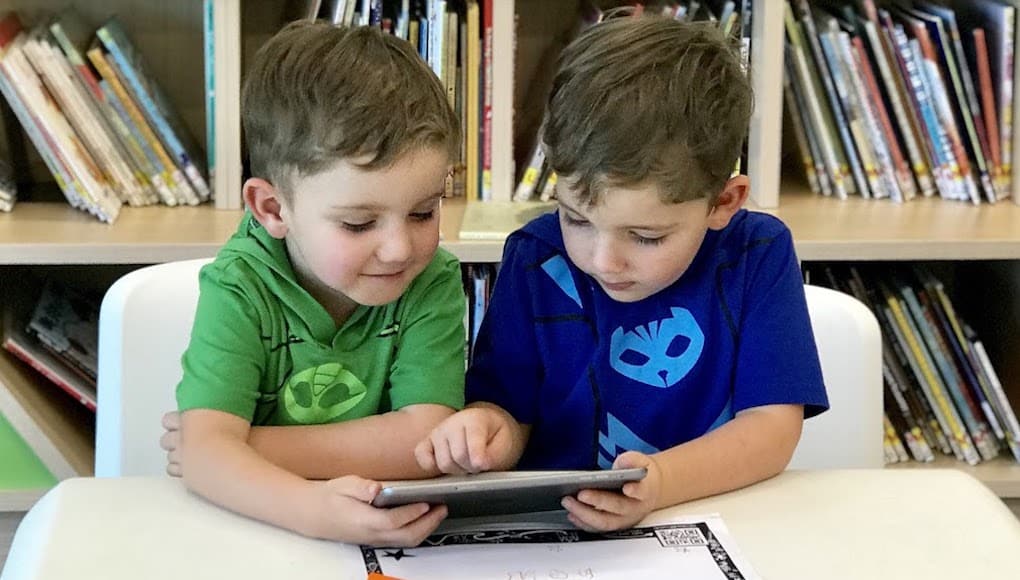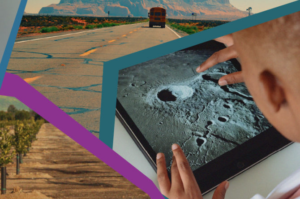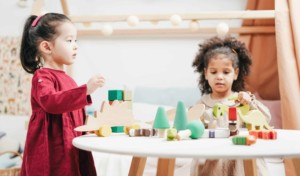The State of Digital Play in Preschool

By: Katrina Youdale
As I walked around the local school on the new parents’ induction tour, the headmistress proudly announced that the next stop was their ‘book’ library. She then continued to explain how they choose to keep the main ‘book’ library and small book nooks in every classroom. Apparently, this is no longer a given. Schools are choosing not to have libraries. They are accessing books online. What else have I not even thought to ask? This digital discussion suddenly became very real.
Early childhood is such a coveted time for development it’s heartening to know that there is a great deal of debate as to how that time should be spent. And rightly so, 90% of brain growth happens before we are 5. As babies are born with all the brain cells we will have for life. Then the connections between these cells start developing and that’s what drives core brain functions and enable us to move, think and communicate. From birth to age five, these pathways develop faster than at any other time in our lives. We can affect these by repetitive exposure to positive experiences such as reading, talking and playing. No pressure parents, but brain development during this period will impact our children’s’ ability to learn for the rest of their lives.
I want my children’s’ brains to be more like lower Manhattan than outback Australia, but I also want them to enjoy being a child.
The good news is that play-based learning is becoming favored as the most effective way to engage kids to learn key foundation skills such as analysis, evaluation, problem solving and creativity.
Definitions of ‘play’ are something that academics have been building up and smashing down in the sandpit for years. Play is different things to different people. Thankfully we all have different interests, different preferences, and different styles. The things that are agreed; play is an enjoyable, engaging and necessary for early childhood education (ECE). Play, learning, and development are interconnected. This has been true across cultures for centuries.
Most quality preschool programs are made up of free play and guided play in which some activities are child led and some teacher led. No, it’s not a free-for-all. Teachers spend time carefully creating stimulating environments where children can choose what activities to pursue and teachers follow their ques and guide them with thoughts and questions to extend their thinking. Important basic academic skills are also included throughout.
It doesn’t mean that our children should swing on the monkey bars all day, but reports show that how children start school will impact their learning life. Begin as you mean to go on. Preschool is just that – Pre School. Its preparation for the main event. Children that have a strong start to school generally continue to perform well through their learning pursuits and the opposite also rings true. (Goldfeld, O’Connor, Quach, Tarasuik, & Kvalsvig, 2015).
Play encourages a positive approach to learning. It is also more inclusive for those children who are not yet ready for formal education. It inspires curiosity, imagination, and enthusiasm. It promotes ideas generation and collaboration which comes with it the need to negotiate, compromise, empathize and manage the emotional outcomes of winning or losing within a group. Play is also more likely to include movement which is essential for motor skills and creating healthy habits for body and mind. Play is equally as important at home.
“Play with parents and peers is fundamentally important for developing a suite of 21st-century skills, including social, emotional, language and cognitive skills, all needed by the next generation in an economically competitive world that requires collaboration and innovation.” Pediatrician Michael Yogman, MD, FAAP, author of American Academy of Pediatrics clinical report, ‘The Power of Play,’
Enter Digital.
 The 2010 launch of the iPad was the wave that started the technology tsunami. The dramatic home computing leap from mouse and keyboard to handheld touch screen devices opened the playing field for users as young as two. Since then, for better or worse, children’s usage has skyrocketed with the increased availability and popularity of smartphones.
The 2010 launch of the iPad was the wave that started the technology tsunami. The dramatic home computing leap from mouse and keyboard to handheld touch screen devices opened the playing field for users as young as two. Since then, for better or worse, children’s usage has skyrocketed with the increased availability and popularity of smartphones.
‘How to manage screen time’ has become an overwhelming theme for young families. Published recommendations are shrouded with confusion and skepticism. The truth is that we don’t yet know what the effect of screen time is and we don’t want to compromise the natural path of discovery which teachers youngsters vital information about the world around them.
Pramod Sharma, founder, and CEO of educational games system Osmo, “We should probably make a ‘Healthy Tech Time Pyramid’ like we have for food groups,” he said. “Passive tech time and solo tech time should be done in small amounts.”
The growing consensus supports a moderated use of technology with a focus on shared digital experiences, particularly in the early years. This means sit, experience and enjoy screen-related activities with your family. With all that rapid brain development burning away between your children’s ears help them develop their own sense of curiosity, creativity and enhance their social abilities.
Early adoption has become increasingly ‘early’ with an American Academy of Pediatrics report reporting that 75% children at age 4 own mobile device and most 3- and 4-year-olds used devices without help, and one-third engaged in media multitasking.
The reality is, most kids start kindergarten being able to navigate a device better than their teacher. Teachers are working harder to engage kids’ interest and sustain it. We are also seeing a worldwide introduction of Science Technology Engineering and Maths (STEM) into Kindergarten curriculums. It may sound daunting but the principles of STEM centre around solving real-world problems through collaboration and hands-on inquiry. They work seamlessly with play-based learning.
Schools vary dramatically with the extent to which they are incorporating technology into kindergarten. One leading example is the Early Learning STEM Australia pilot program which is in its second year.
‘The ELSA program is based on the Experience, Represent, Apply model. This model enables children to Experience a concept first with a hands-on activity. Then they can Represent this concept on an ELSA app in a game format. This is then followed with opportunities to Apply the concept to their own environment. ‘
I understand the need to prepare kids for their digital future, but I worry about technology for technology’s sake. I am excited to see the emergence of Augmented Reality (AR). It’s the perfect playmate for pre-schoolers.
AR doesn’t just take an offline activity online, like many children’s apps that shape match or write letters on a screen. It literally takes your environment and adds a layer of magic. AR can take the information from a static page and grow it off the page into a 3D object that can be viewed from all angles. Imagine seeing a volcano in a book then holding a device over it to see how the lava swells from the earth below and erupts.
AR is collaborative and engaging. It visualizes complex concepts in a way that is simple for a kindergarten audience to understand. Play can be nonsensical and transformative, AR embodies and delivers this experience. It is intrinsically motivating.
To enact AR you need an app and often some printed material with a trigger point. As more AR resources become available, teachers and parents will able to quickly create a fun learning environment at a relatively low cost. It’s easy and fun.
Play is important for all ages. When we play we feel more relaxed and optimistic. So, sit with your kids. Get out an iPad or get out some paper. Play together. Learn from each other.
For more, see:
- No-Collar Jobs Offer Schools Chance to Create Mashups of Academics and Vocations
- Blending Engineering, Entrepreneurial Mindset, and an Appreciation for the Variety of the Human Condition
- The Shift to Innovation Through the Power of Networks
Katrina Youdale is a digital strategist and creator of educational AR apps for the ECE sector. Find Katrina on Twitter at @NarratorAR.
Stay in-the-know with innovations in learning by signing up for the weekly Smart Update.







0 Comments
Leave a Comment
Your email address will not be published. All fields are required.